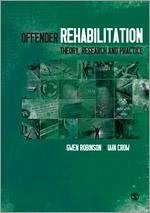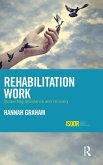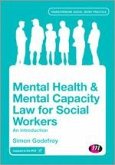'Robinson and Crow have achieved the seemingly impossible: a book about rehabilitation that transcends the "medical model", that is original and contemporary yet grounded in a sophisticated history, and most of all that is fun to read. It will become a new classic text in a field that has been crying out for one' - Professor Shadd Maruna, Queen's University, Belfast 'In an age where there is much public and political confusion about many criminal justice matters, this book brings considerable clarity to the idea of rehabilitation, its theoretical and historical roots, and contemporary practical application. This is an accessible, lively, and critical account of a concept which is central to the shape of the criminal justice system in pursuance of something that will "work" to reduce reoffending. "Rehabilitation" seems to go in and out of fashion depending on the politics of the day, but the careful and thorough examination of the different contexts in which it operates and competing perspectives on its potential offered here highlights its enduring qualities. This is a fascinating and engaging book by two established and "real world" scholars which will serve students and policy makers alike in the fields of criminal justice and social policy' - Loraine Gelsthorpe, Reader in Criminology and Criminal Justice, Institute of Criminology, University of Cambridge This comprehensive text explains all the key themes in the development and practice of offender rehabilitation. It explores how the issue fits within its wider social and political contexts, giving an insight into its current and future relevance to criminal justice. The book covers the full range of rehabilitative approaches, exploring how criminal justice responses have been influenced by trends such as the treatment model, 'What Works?', desistance, risk and public protection, and changes in social policy. It offers the following essential features: " theoretical grounding - providing students with all the essential background they need in order to fully understand the subject " historical context - enabling the reader to see how ideas, policies and practices have developed over time " research focus - introducing the reader to questions about how rehabilitative approaches have been evaluated and debates about 'what works' for particular groups of offenders, such as sexual offenders and drug misusers " study questions and further reading - giving students the tools both to revise and to expand their knowledge Offender Rehabilitation both advances thinking about the notion of rehabilitation, and ensures that students of crime and justice can keep abreast of the most recent developments in this area.
Hinweis: Dieser Artikel kann nur an eine deutsche Lieferadresse ausgeliefert werden.
Hinweis: Dieser Artikel kann nur an eine deutsche Lieferadresse ausgeliefert werden.
Robinson and Crow have developed a satisfactory primer on the complex and increasingly important topic of offender rehabilitation...Offender Rehabilitation is well-written, easy to comprehend, and touches upon major issues in less than 200 pages... [it] provides a framework for scholars and students to understand the topic. It is easily read and written by experts in the field. Anyone interested in the topic of offender rehabilitation should read this book
Daniel W. Phillips III
The Kentucky Journal of Anthropology and Sociology
Daniel W. Phillips III
The Kentucky Journal of Anthropology and Sociology








